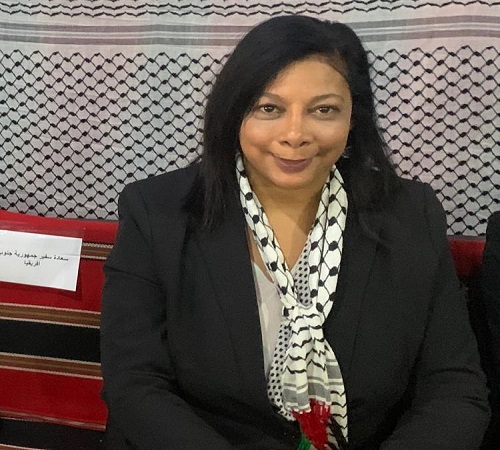By Reneva Fourie – policy analyst specialising in governance, development and security
It is difficult to conceive that South Africa was a nation at war just over thirty years ago. One of the deciding negotiating factors was that the violence in the country had reached levels where
all warring parties simply wanted the bloodshed to end. Is there sufficient political will among the stakeholders to end the war on Palestine?
While Palestinians have always resisted colonialism, death has been a constant presence in Palestine since the establishment of the state of Israel in 1948. Israeli armed forces have been responsible for killing at least 31,627 Palestinians between 1948 and September 20231. The number of Palestinian fatalities in Gaza and the West Bank has skyrocketed between October2023 and May 2024, with over 35,000 people killed and more than 78,000 injured. How many more lives must be lost before the violence stops?
The Palestinian negotiating parties have again extended an olive branch to the Israelis. On 7th of May, the Palestinian negotiators indicated a willingness to accept a document on basic principles for an agreement between the Israeli side and the Palestinian side in Gaza on the exchange of detainees and prisoners between the two parties and the return to sustainable calm. In this agreement, the Palestinians commit to releasing all Israeli hostages, civilians and soldiers, alive or otherwise. In turn, the deal offers the release of a mutually acceptable number of Palestinians, an end to hostilities, the withdrawal of Israeli armed forces from Gaza, and reconstruction of the area.
The agreement was tabled with Qatar, Egypt, the United States, and the United Nations as the guarantors. It proposes an implementation in three phases of 42 days each. During the first phase, captives over the age of 50, women and children, and the sick will be systematically exchanged. This will be accompanied by selective withdrawals of Israeli troops, the return of displaced persons, and unhindered access to humanitarian aid.
The second phase focuses on the cessation of military and hostile operations and the release of the remaining Israeli men in exchange for an agreed number of detained Palestinians. In the third and final phase, the focus will be on the reconstruction of Gaza.
Despite the agreement not differing substantially from the US proposal agreed to by Netanyahu earlier, the apartheid Israeli regime rejected the olive branch offered by the Palestinians in the harshest possible way. On the same day, the Israeli army took control of the Rafah crossing and bombarded the town with missiles, causing the death and injury of many Palestinians. The escalation of aggression showed no regard for the safety of Israeli captives, some of whom have already died because of the Israeli army’s attacks on Palestinian territories. This vile rejection of a much-needed opportunity for normality portrays Netanyahu as someone with little interest in peace. He had repeatedly stated that his objective was the decimation of all Palestinians. And, as Hitler went all out to try and exterminate every Jewish person in Germany, it appears that Netanyahu will not stop until he has obliterated every Palestinian.
The reason behind Netanyahu’s erratic behavior is not clear. It could be an attempt to divert attention from the corruption charges against him or to satisfy religious extremists and right-wingers to maintain his grip on power. It could also be linked to a speculated significant construction project planned for the Gaza Strip, such as a substitute for the Suez Canal or a gas pipeline. Alternatively, it could be a strategy to undermine Iran and strengthen the West’s influence in the region. Regardless of the reason, it is imperative that we take action to put an end to the violence and bloodshed.
International solidarity played a crucial role in ending apartheid in South Africa. Similarly, it can help pressure Western governments to stop arming Israel and encourage the Israeli government to commit to a peaceful settlement. People who advocate for peace must continue to support the Palestinian people by raising awareness, conducting protests to pressure governments and Western embassies, promoting the boycott, divestment and sanctions campaign, encouraging workers to refuse to load weapons going to Israel, facilitating humanitarian aid, and demanding that the International Criminal Court issue arrest warrants to those responsible for the massacre of Palestinian civilians. The Global Anti-Apartheid Conference in South Africa on May 10-12 was an important platform for coordinated civic actions. It complements other initiatives, such as the Palestine International Friends Alliance. South Africans should also use the 29 May general elections to vote for political parties other than those who have historically supported apartheid Israel. As responsible members of the global community, it is our collective responsibility to take measures to prevent the extinction of any nation. We need to commit ourselves to a sustained campaign for an end to the aggression against Palestinians and a negotiated settlement in favour of the people affected. Stability in West Asia contributes to stability in the world at large.
Championing a culture of peace and cooperation not only benefits us now but paves the way for a brighter future for all.
This was a special interview for Syria Times where Dr.Fourie commented on the current situation in occupied Palestine.
Reem Haddad
Editor-in-Chief

